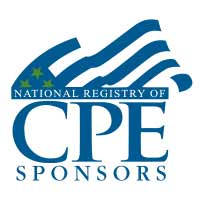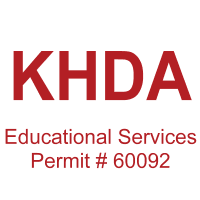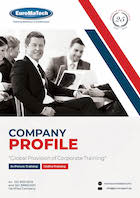
An Intensive 5-day Training Course
Aboveground Storage Tank Inspector (API 653)
Internal & External Inspection for Reliability & Environmental Impact
- Format: Classroom
- Duration: 5 days
- Language: English
- Accredited: CPE, KHDA Certified training courses
CLASSROOM DATES
ONLINE DATES
INTRODUCTION
Aboveground Storage Tanks (ASTs) are used for storage of petroleum products prior to use, while being used, or prior to further distribution in commerce. These tanks cannot be commissioned for the storage of petroleum products unless its material and construction are inspected to be compatible with the products to be stored and conditions of storage such as pressure and temperature. Also, storage tank installation must be engineered or updated in accordance with good engineering practices to avoid discharges.
EuroMaTech’s highly interactive Aboveground Storage Tank Inspector (API 653) training course will help professionals working in refineries and petrochemical plants to enhance their functional technical skills. The knowledge gained in the training course will enable them to evaluate the integrity of existing equipment and quantify the remaining life in operation after carrying out appropriate cost-effective repair options. This will enhance their overall technical effectiveness regarding improved plant reliability and safety of operation with positive environmental impact. The training course will basically cover API recommended Body of Knowledge for API-653, Aboveground Storage Tank Inspector Certification Examination and will therefore also serve as a good preparation material for taking and passing that examination successfully.
Participants attending the Aboveground Storage Tank Inspector (API 653) training course will develop the following competencies:
- Full confidence in performing various inspection activities
- Enhanced job effectiveness regarding equipment repairs & alterations
- Improving the plant technical reliability and environmental safety
- Help your technical team find good solutions in complex operational situations
- Organization of effective inspection teams with clear roles and responsibilities
- Preparation of participants for taking API 653 Certification Examination
TRAINING OBJECTIVES
Upon completion of EuroMaTech’s Aboveground Storage Tank Inspector (API 653) training course, the participants will demonstrate important skills and will be;
- Competent to carry out internal and external inspection of storage tanks.
- Familiar with the relevant codes, standards and specifications
- Knowledgeable to make required inspections independently
- Capable to perform calculations related to in-service deterioration, repairs, rerates, or alterations
- Ready and prepared to take and successfully pass the API 653 Inspector Certification Examination to become API Certified Inspectors.
WHO SHOULD ATTEND?
This Aboveground Storage Tank Inspector (API 653) training course is suitable for a wide range of technical professionals, but will be particularly beneficial to:
- Plant engineers dealing with inspection, maintenance & repairs of storage tanks
- Equipment reliability and integrity supervisors and HSE engineers
- Planners of cost-effective operation of in-service storage tanks
- Material engineers and technicians dealing with corrosion and material protection
- Safeguarding and MOC engineers

TRAINING METHODOLOGY
The Aboveground Storage Tank Inspector (API 653) training course will be conducted along workshop principles with formal lectures and interactive worked examples and with active contribution by all participants during discussions and team work in workshops. Samples of real examination questions will be selected to help participants be well prepared for the final examination.
The emphasis will be on the explanation of technical phenomena contained in the Body of Knowledge for API 653 Inspector Certification Examination and providing answers to problems that are encountered. There will be ample opportunities for active open discussion and sharing professional experiences.
TRAINING SUMMARY
EuroMaTech’s Aboveground Storage Tank Inspector (API 653) training course covers essential skills needed by engineers to handle internal and external inspection of storage tanks operating in refineries and process plants. The training course will provide real life examples and case studies so that participants can adapt different methodologies. The participants will be able to develop deeper knowledge on how to handle different situations encountered in the everyday engineering practice and will be ready and well prepared to take and successfully pass the Inspector Certification Examination.
TRAINING OUTLINE
Day 1 - Calculations & Tabular Evaluations for Evaluating Thickness Measurements, Weld Sizes, Tank Integrity
- Corrosion Rates and Inspection Intervals (API 575, Paragraph 7.2)
- Joint Efficiencies (API 653 Section 4)
- Maximum Fill Height: Hydrostatic Testing API 653, Section 4)
- Weld Size for Shell & Roof Openings (API 650, Figures 5.7 – 5.21)
- Hot Tapping (API 653, Paragraph 9.14)
- Settlement Evaluation (API 653 Annex B.2.3 – B2.5)
- Number of Settlement Points (API 653 12.5.2, Annex B)
- Impact Testing (API-650, 4.2.9.3)
- Existing Tank Shell – Minimum Thickness s (API-653, 4.3.3.1)
- Reconstructed Tank Shell – Minimum Thickness (API-650, Table 5-2)
- Tank Shell Corroded Area (API-653, 4.3.2.1)
- Tank Shell Pitting (API-653, 4.3.2.2.a)
- Bottom Plate Minimum Thickness (API-653, 4.4.5.1)
Day 2 - Welding of Atmospheric Above Ground Storage Tanks: ASME Section IX, Welding and Brazing Qualifications
- Elements of Welding Technology
- Knowledge and skills: SMAW and SAW welding processes:
- WPS & PQR
- API-650 Standard: Welded Steel Tanks for Oil Storage: General rules: Section 9
- API Standard 653, Tank Inspection, Repair, Alteration, and Reconstruction: General rules: Section 11
- Number, Type, and Results of Mechanical tests
- Replacement Plates
- Lap Welded Patch Plates
Day 3 - Non-Destructive Examination: ASME BPV Section V: NDE Testing
- General Requirements: Responsibilities, Qualifications
- Calibration, Record Keeping
- Radiographic Examination: Butt Welds, Seams, Placement of IQIs, Records
- Liquid Penetrant Examination: Mandatory Appendix II, Interpretation
- Magnetic Particle Examination (Yoke and Prod techniques)
- Ultrasonic Standards: Measuring thickness with Manual Ultrasonic Pulse-Echo Contact Method:
- API-650 and API-653: General Nondestructive Examination requirements
Day 4 - Practical Knowledge: General
- Organization and Certification Requirements
- Types and Definitions of Inspections
- Types of Corrosion and Deterioration
- Materials and Fabrication Problems
- Welding Technology
- Nondestructive Examination (NDE) Methods
- Corrosion and Minimum Thickness Evaluation
- Estimated Remaining Life.
- Inspection Interval Determination and Issues Affecting Intervals
- Inspecting Relief Devices
- Inspection Safety Practices
- Inspection Records and Reports
- Repairs / Alterations
- Disassembly and Reconstruction
- Hydro Testing
- Pneumatic Testing
Day 5 - Practical Knowledge: Specific
- API RP 571: Damage Mechanisms Affecting Fixed Equipment in Refining Industry
- Brittle Fracture (4.2.7)
- Mechanical Fatigue (4.2.16)
- Atmospheric Corrosion (4.3.2)
- Corrosion Under Insulation (CUI) (4.3.3)
- Microbiologically Induced Corrosion (MIC) (4.3.8)
- Soil Corrosion (4.3.10) – Caustic Corrosion (4.3.9)
- Chloride Stress Corrosion Cracking (Cl-SCC) (4.5.1)
- Caustic Stress Corrosion Cracking (Caustic Embrittlement) (4.5.3)
- Sour Water Corrosion (Acidic) (5.1.10)
- Sulfuric Acid Corrosion (5.1.11)
- API RP 575: Inspection of Atmospheric and Low-Pressure Storage Tanks
- Procedures to perform internal and external inspection
- Types of external and internal inspections
- Evaluation change-of-service effects on suitability for continued service
- Evaluation of distortions, flaws,
- Condition of nozzles, wind-girders, stiffeners
- Evaluation of tank bottoms, tank foundations & anchor bolts
- Causes of corrosion, leaks, cracks, and mechanical deterioration
- Shells and roofs, pipe connections
- API RP 577: Welding Inspection and Metallurgy
- Welding processes & inspection
- Welding materials & procedure: filler metal selection
- Welder qualifications
- Non-destructive examination (NDE)
- Refinery & Petrochemical Plant Welding Issues
- Actions to address improperly made welds
- Report of RT results
- API Standard 653, Tank Inspection, Repair, Alteration, and Reconstruction and the related portions of API Standard 650, Welded Steel Tanks for Oil Storage
- Tank Internal & External Inspection
- NDE procedures and NDE personnel qualification requirements
- Safe working practices
- Thickness & Dimensional Measurements & Tolerances
- Frequencies and intervals for external and internal inspection
- Types of Roofs & Seals and Ways of Deterioration
- Reasons for Inspection and Causes of Deterioration of Storage Tanks
- Procedures to Check or Test Storage Tanks for Leaks
- Tools & equipment for tank inspection
- Failure assessment and deterioration of auxiliary equipment
- Suitability for continued service: Change-of-service effects
- Evaluation of tank bottom conditions & tank foundation conditions
- Risk of failure due to brittle fracture
- Causes of corrosion, leaks, cracks, and mechanical deterioration.
- Repairs to foundations, shell plates, welds, tank bottoms, nozzles & penetrations, roofs, seals
- Knowledge of repair/alteration material and toughness requirements
- Use of unidentified materials for repairs/alterations
- Hot tap requirements and procedures
- Inspection and NDE requirements for repairs and alterations
- Hydrostatic and leak testing requirements
- Lap welded patch plates (API-653, 9-3)
- New bottoms supported by grillage API-650, Annex I
- Requirements for recording inspection data and records related to inspection, repairs, and alterations
- API RP 651, Cathodic Protection of Aboveground Petroleum Storage Tanks (Sections 1, 2, 3, 4, 5, 6, 8, and 11)
- Corrosion of Aboveground Steel Storage Tanks
- Determination of Need for Cathodic Protection
- Methods of Cathodic Protection for Corrosion Control
- Operation & Maintenance of Cathodic Protection Systems
- API RP 652: Lining of Aboveground Petroleum Storage Tank Bottoms
- Types of tank bottom linings, materials, advantage and disadvantages
- Causes of tank bottom lining failures
- Surface preparation requirements for installation of tank bottom linings
- Issues affecting application of tank bottom lining
CALL ME BACK
Do you wish for us to conduct this course at your premises?
Discover In-House Solutions
ACCREDITATION

EuroMaTech is registered with the National Association of State Boards of Accountancy (NASBA) as a sponsor of continuing professional education on the National Registry of CPE Sponsors. State boards of accountancy have final authority on the acceptance of individual courses for CPE credit.

Euromatech is a Knowledge & Human Development Authority (KHDA) approved training institute in Dubai, licensed and approved to deliver training courses in the UAE.
The KHDA is the regulatory authority in the UAE, that oversees administering, approving, supervising, and controlling the activities of various education providers in the UAE. We are proud of our commitment to ensuring quality training courses and status as a KHDA-approved training provider.
Taught by our team of highly qualified trainers, our KHDA approved training courses will provide you with an enriching learning experience and practical knowledge that will help you future-proof your career and support professional development within your organisation.

